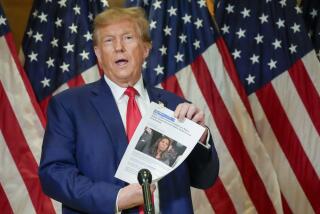U.S. to allow first lawsuits against Cuba over seized property
- Share via
Reporting from Washington — To turn up pressure on Cuba’s communist government, the Trump administration is reversing longstanding practice and allowing U.S. citizens to sue certain Cuban companies over property expropriated decades ago, officials said Monday.
U.S. officials said they intend to hold government and military leaders in Cuba accountable for homes, businesses and land seized after the late Fidel Castro rose to power in a 1959 revolution.
The administration, however, stopped short of including among the potential targets for legal action European, Canadian or other foreign-owned companies that have invested on the island.
The decision to shield them from lawsuits may have been a gesture to allies who have joined the United States in a campaign to oust the autocratic leader of Venezuela, Nicolas Maduro. Punishing companies from other countries would erode the international support that Trump’s advisors have been keen to develop and maintain in the Venezuela campaign.
Even without the foreign companies, Monday’s reversal of practice could badly disrupt U.S. trade with Cuba and have other consequences. The decision effectively tightens an economic embargo that Washington slapped on Havana nearly 60 years ago.
It addresses a long-dormant provision of the 1996 Libertad Act (also known as the Helms-Burton Act), a law that imposed numerous restrictions on Cuba and U.S. dealings with the island. The provision allowed American citizens to sue to regain expropriated property or to be compensated for it, but it was immediately waived out of fear of flooding U.S. courts with extremely complicated cases.
Each administration since has renewed the waiver every six months, as required by law, until now.
Secretary of State Michael R. Pompeo, in a statement, announced that the waiver was being partially lifted to allow limited lawsuits. He set a 30-day period to examine the impact and determine additional actions.
Despite more than half a century of Cold War-era tensions, restrictions on Cuba were relaxed under President Obama, who normalized diplomatic relations between Washington and Havana and allowed more travel to and from the island. But Trump, whose government calls Cuba part of a Troika of Terror, with Venezuela and Nicaragua, has slowly rolled back some of the changes.
Hundreds of thousands of Cubans fled the island after Castro took over, many forced to leave behind vast holdings of farmland, villas and businesses. The majority settled in southern Florida and continue to represent a conservative anti-Castro political base within the Republican Party.
Sen. Marco Rubio (R-Fla.), the son of Cuban exiles, welcomed the loosening of legal recourse and said Cuba should also be punished for its life-sustaining support of Maduro’s Venezuela.
“Justice is coming — and it is just getting started,” Rubio said in a statement after the administration’s announcement.
The companies that can be sued are on a list of entities controlled by the Cuban military, intelligence and security services.
A senior State Department official, briefing reporters on the condition of anonymity, called the decision “historic,” and said: “It’s finally giving claimants a measure of recourse and the opportunity to bring suits against these entities.”
Future lawsuits could open the door to confiscation of Cuban products exported to the United States and elsewhere, including cigars and cement. Two of the biggest conglomerates that are likely to face legal actions are Cimex (Cuban Export-Import Corporation) and Gaesa (Armed Forces Business Enterprises Group), which is controlled by the military and represents hundreds of businesses and tens of thousands of jobs. Gaesa is said to control more than 50% of the Cuban economy, touching nearly every sector.
As complex as the legal process would be, thousands of people who fled Cuba may well take advantage of the opening.
Exiles “will no longer just be telling folk stories about what we once had in Cuba,” but will be armed with a federal court judgment and award, said Robert Muse, a Washington attorney who tracks Cuban property cases. “This could be very disruptive for future trade,” he added.
Trade between Cuba and the United States has expanded in recent years, enough that the change could be disruptive for producers in farm states, including Arkansas, which now export chicken and other food products to the island nation.
Analysts who follow Cuba policy expect that the decision is a forerunner to a complete ending of the waivers, which would open the floodgates to suits targeting any business in Cuba.
While the administration delayed a final decision for at least another month, “potentially everyone can sue,” said John Kavulich, president of the U.S.-Cuba Trade and Economic Council, a New York research group. “It’s up to judges now … which, I believe, is precisely the point.”
Kavulich said there are an estimated 200,000 potential plaintiffs but only 5,913 certified claims, valued at nearly $2 billion.
For more on international affairs, follow @TracyKWilkinson on Twitter.
More to Read
Sign up for Essential California
The most important California stories and recommendations in your inbox every morning.
You may occasionally receive promotional content from the Los Angeles Times.











